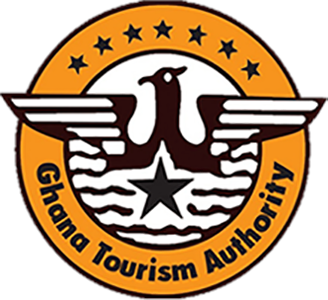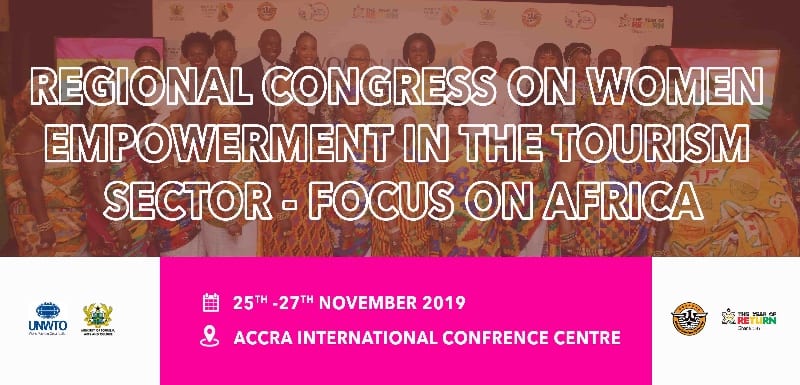Ghana is hosting the First Regional Congress on Women Empowerment in the Tourism sector – Focus on Africa.
The Secretariat of the World Tourism Organization (UNWTO), welcomes the Members of the UNWTO Commission for Africa, the Affiliate Members, International Organizations in the region to the First Regional Congress on Women Empowerment in the Tourism sector – Focus on Africa to be held in Accra as follows:
Date: November 25-27, 2019
Venue: Accra International Conference Center (AICC)
Programme (Out Soon)
Monday 25 November 2019 (Day 1)
Tuesday 26 November 2019 (Day 2)
Wednesday 27 November 2019 (Day 3)
ALSO, REGISTER HERE
Welcome Message from Hon. Barbara Oteng-Gyasi, Minister of Tourism, Arts & Culture
Registration
REGISTER HERE
ABOUT
Background and objectives of the congress
Gender equality is vital for the prosperity and sustainable development of all countries and societies, ensuring that nobody is left behind. The importance of gender equality and the empowerment of women and girls has been underscored in Sustainable DevelopmentGoal (SDG) five of the United Nations 2030 Agenda for Sustainable Development which aims to achieve gender equality and empower all women and girls by 2030.
In the last decade, much advancement has been made in women’s empowerment, but women are still far from enjoying the same basic rights, privileges and benefits that men have. Women still earn much less than men, do a disproportionate amount of unpaid care and domestic work, are less able to enjoy their rights, lower social mobility, and limited access to resources.
Research for the Second Edition of the Global Report on Women in Tourism to be published by UNWTO, in collaboration with UN Women, GIZ, the World Bank and Amadeus shows that tourism has the potential to contribute to greater gender equality, providing provides women with more opportunities for empowerment than other sectors. Women are increasingly using tourism to combat gender stereotypes, the employment situation for women in tourism is improving in many countries and the introduction of gender-specific tourism policies has had a positive impact for women’s empowerment in the sector.
In Africa, tourism is recognized more and more as a strategic tool for inclusive development and many countries have integrated the sector into their national and socio-economic agendas. The sector has enormous potential to create employment opportunities and spur economic development. It contributes to 8,5 % of the Gross Domestic Product (GDP) in the region, creates more than 21 million jobs directly and indirectly[1]and underpins the economic sector for some countries for instance, Cabo Verde, Mauritius, Morocco, Rwanda and Seychelles.
The role of African women in the tourism value chain is intrinsically tied to the sustainable development of the sector as persisting gender inequalities hamper growth and come at a significant cost to productivity. Despite progress in recent decades, women in Africa are still not leading the sector and female talent remains one of the most underutilised resources as they largely continue to occupy the lower-paid jobs.
Current population dynamics, as well as the need for social mobility and inclusive growth, make gender equality efforts all the more imperative in Africa. Furthermore, women’s empowerment presents a sound business case with an estimated 160.2 trillion USD[1]lost globally per year due to gender inequalities, highlighting the need to fully integrate women at all levels of society
African governments have made important efforts and demonstrated commitment to women’s empowerment. Countries such as Ethiopia, Rwanda and South Africa have attained a gender balance in ministerial positions and so June 2019, thirteen African women ministers hold the tourism portfolio.
The African Union Agenda 2063 places women’s empowerment, gender equality and youth at the core of African social and economic development and has identified tourism as a development tool in line with the UNWTO Agenda for Africaroadmap for inclusive growth on women empowerment through tourism. However, persisting barriers to education and training mean many women enter the tourism employment market without the necessary skills. This inequality leaves more women concentrated in the lowest-paid, most vulnerable sectors of the industry and carrying out a large amount of unpaid work in family tourism businesses.
Through a concerted effort across the public and private spheres to mainstream gender-equality policies, the tourism sector can undeniably play an increased role in helping women from disadvantaged communities to break the poverty cycle. The sector can provide greater opportunities for employment, entrepreneurship, and community-based initiatives as well as helping to address the educational gender-divide through vocational training opportunities and increased interaction with new technologies.
As part of the women’s empowerment initiative in Africa, UNWTO will launch a competition in collaboration with Wakalua and IE Business School for African women followed by a Masterclass on-site regarding women’s empowerment and tourism education in Africa. The aim is to provide a platform for women in technology in Africa to showcase their vision for a more inclusive, sustainable and competitive tourism sector.
In view of the above, the first Regional Congress on Women’s Empowerment in the Tourism Sector that will take place in Accra, Ghana from 25 to 27 November 2019 aims to:
● Work towards mainstreaming gender equality and women’s empowerment within policy frameworks.
● Analyze the current challenges and opportunities for women’s empowerment in the tourism sector.
● Exchange and share national experiences on women’s empowerment.
● Engage stakeholders to support and increase the participation of women in education, entrepreneurship and leadership.
● Explore new opportunities for women’s empowerment using technology.
● Create synergies among African countries and key stakeholders for greater cooperation in the promotion of women’s empowerment in the tourism sector.
● Identify gaps in the collection of sex-disaggregated data collection and areas for future research.
REGISTER HERE
Target Audience
● Tourism stakeholders – National Tourism Administrations, Tourism Ministries, public authorities and public gender-equality institutions.
● Private sector representatives with an interest in working on women’s empowerment and tourism development in the region.
● Civil society and NGOs related to women’s empowerment and gender equality.
● Representatives from other sectors which have an impact and interest on women empowerment in the tourism sector in Africa.
Format
● The regional congress aims to bring together a number of tourism stakeholders in a series of panels to share best practice and set common proposals to address gender equality in the tourism sector for inclusive development in Africa
● The Regional Congress aims to be practical, informative and participative.
● Keynote speakers will be invited to set the tone at the beginning of each panel.
● Presentations from international experts will be complemented by the experiences of practitioners from African countries.
REGISTER HERE
Expected outcomes
- Engage stakeholders to mainstream a gender perspective and women’s empowerment in tourism policies and strategies
- Speed up the progress of women empowerment towards the achievement of the SDGs.
- Present proposals to improve women’s participation in the workforce, increase women’s entrepreneurship and women’s leadership in the sector.
- Use existing platforms such as tourism for SDGs[1]and other media channels to promote and advocate for women’s empowerment in the tourism sector.
- Sensitize all stakeholders to work to end sexual exploitation in tourism and the exploitation of women as cheap labour.
The following themes will be addressed:
Panel 1 Tourism policies to enable gender equality
Do government policies take into consideration and address gender inequality challenges in the tourism sector? Can a focus on gender equality within Tourism policies and investment in women’s empowerment projects make a destination more competitive and inclusive in the long run? What are some examples of the best tourism policies focused on gender equality in Africa?
Tourism, being one of the fastest-growing economic sectors in the world which accounts for 10% of the world’s GDP, is also a labour-intensive industry in which women make up a large proportion of the formal workforce. However, this does not yet translate in equal benefits since typical women earn 10% to 15% less than their male counterparts. Achieving gender equality and empowering all women and girls by 2030 (Sustainable Development Goal 5) requires a gender perspective to be mainstreamed across tourism policies and authorities in order to shield women’s empowerment efforts from the ever-shifting political landscape. This would help to create an enabling environment for women in the tourism sector, helping to reduce barriers to employment, access to finance and land as well as facilitating specific gender equality initiatives. A sound policy framework, in partnership with civil society and the private sector, together with enforceable legislation can forge an inclusive tourism sector that can impact positively the society and the competitiveness of a destination.
Panel will focus on:
- Mainstreaming a gender perspective in tourism policies to support women empowerment in the tourism sector in Africa.
- How to remove barriers and creating an enabling environment for women entrepreneurs through a non-discriminatory legal framework.
- Case studies from the region showcasing how destinations can become more competitive through the introduction of gender equality policies and investment in women empowerment projects.
REGISTER HERE
Panel 2: Entrepreneurship in tourism, an effective means for women to lead in the tourism sector
Is women’s entrepreneurship a vehicle for women’s empowerment in tourism? What are some of the best practices in public-private partnerships promoting women’s entrepreneurship? What can we learn from women entrepreneurs´ success stories?
Tourism offers women significant opportunities for running their own businesses. Women’s entrepreneurship is particularly crucial in emerging tourism destinations. According to the World Bank, Africa has a comparatively high rate of female entrepreneurship and women are also more inclined to engaging in social entrepreneurship which has large community benefits. However, women still face considerable barriers that inhibit the growth of their businesses such as lack of capital, social constraints and limited time and skills. Notwithstanding, success stories of aspiring businesswomen unleashing their potential can be found from the savannahs of Upper East Ghana to the coasts of South Africa. Gender-sensitive macroeconomic policies, a supportive environment for investment and increased market access can be decisive for women to venture in creating their own businesses.
This panel will focus on:
- The importance of women’s entrepreneurship development as an instrument of women empowerment.
- Female tourism entrepreneurship and women’s cooperative success stories.
- Public-private partnerships for effective gender equality outcomes and female entrepreneurship support.
REGISTER HERE
Panel 3: Financing Women Empowerment Through Tourism – Challenges and the Way Forward
What funding programmes already exist for women empowering projects? What traditional and non-traditional funding sources are there available for women entrepreneurs? How can we attract funding for women’s empowerment in the tourism sector through development institutions?
Despite the economic significance and growth potential of tourism, as well as its frequent recognition in development policies and priorities, the level of official development assistance (ODA) aimed at the sector remains disproportionally low at 0,17% of overall ODA. Although women’s empowerment is established as a priority area across many funding programmes, a focus on tourism as a tool for development within this context remains elusive. Examples of investment in gender equality in the tourism sector in Africa, however, highlight the valuable lessons learned as well as the challenges that remain, including how an increase in financing can be achieved sustainably.
This panel will focus on:
- The role that women’s empowerment in the tourism sector can play in furthering the objectives of development organizations.
- Existing or future funding programmes and opportunities available for gender-equality in tourism.
- Best practices and case studies in obtaining funding for women’s empowerment projects.
REGISTER HERE
Panel 4: Education and technology as a tool for women’s socio-economic advancement in Tourism
Why is it important to support women’s access to equal education in the tourism sector? How can technology create better economic opportunities for women? How can education help women take on leadership roles in the tourism sector?
Despite women representing 60 to 70% of the world’s tourism workforce, according to ILO data (2017), women still have more limited access to training and education in tourism. Lower-skilled women are then more likely to occupy lower-qualified, more vulnerable jobs and are underrepresented in managerial and leadership positions. In addition, according to ITU (2017), just 18.5% of African women have access to the internet compared to 25% of African men. Education is one of the most important means of empowering women with knowledge, skills,
self-confidence and facilitating their access to the economic opportunities that technology and digital platforms offer in the tourism sector. These are fundamental tools for women to seek a better quality of life for themselves and their families while benefiting at the same time their communities. Furthermore, education is an essential instrument to make women and their families less vulnerable to abuse and labour exploitation practices. It takes a collective effort of governments; international organizations and society to create and stimulate equal access to education in order to bridge the digital gender divide and close the gender gap in the tourism sector.
This panel will focus on:
- Education as a tool for women empowerment.
- Best practices in cooperation development projects focusing on empowering women through capacity-building and skills transfer
- Successful case studies of training programmes for women by tourism companies and industry associations.
- Bridging the digital gender divide in tourism by providing women with the necessary digital literacy skills.


 Call Center
Call Center
